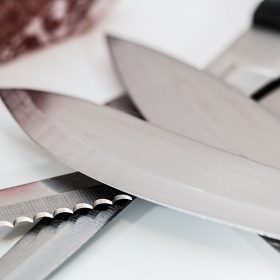Things You Should Have in your Kitchen–Part 3: Groceries
Here I’m talking about staples—things for your pantry, whatever that looks like. So you won’t find things with a short shelf life, like eggs, milk, etc. Though you will need those kinds of things, you will know best what you want in your kitchen. I’m also not addressing spices here, because they have an article of their own—Part 4: Spices. You can also check my recommendations about kitchen tools and stovetop pans.
- Cooking spray, for making surfaces non-stick.
- Olive oil. Something flavorful. Cold-pressed Extra Virgin has the strongest flavor, but also has the lowest smoke point among olive oils. That means that if you’re not paying attention, it might burn.
- Vegetable oil. Canola, soybean, vegetable, sunflower, avocado, grapeseed. Whichever one appeals to you. You want this one to NOT have much flavor.
- Vinegar of your choice, but if you will only have one, don’t choose a strong one (like Balsamic). White, apple cider, red wine vinegar…. Rice vinegar can be nice, but it’s pretty mild. Seasoned rice vinegar has sugar in it. Useful sometimes, but not if it’s the only vinegar you’ve got.
- Flour
- Sugar
- Brown sugar
- Soy sauce or liquid aminos. The latter has much the same flavor but less sodium and can be found in the natural foods section of your grocery store.
- Ketchup
- Baking soda
- Long grain rice: white, jasmine, basmati, brown, whatever sounds fun
- Short grain rice: medium white, pearl, sticky
- Dry pasta. A few different shapes. Spaghetti is good, rotini holds sauce well, elbow macaroni will find its way into lots of things.
- Canned tomato sauce
- Canned diced tomatoes
- A few kinds of canned beans
- A jar of minced garlic. You can find these in your grocery store either with condiments or in the produce section. It’s not as pungent as fresh garlic, but it keeps longer and is nice to have in the fridge for when you spontaneously decide you want to add garlic to something. It doesn’t need refrigeration until you open it, and then it will keep for a really long time in your fridge door. (Never as good as fresh garlic, but good backup.)
- Potatoes. From the produce section. I know they’re perishable and therefore shouldn’t be on this list, but you can always make something if you have potatoes, even if it’s just a lone baked potato for dinner. And they’ll keep for 2-4 weeks in a dark pantry. Do NOT refrigerate them! That turns their starch into sugar, which is not something you want to have happen.
- Onions. Another perishable but necessary item. They’ll also keep for 2-4 weeks, just on your counter. Refrigerating them will make them spoil faster, so don’t. Oh, and don’t store them next to your potatoes, because that also will encourage them to spoil.
- Baking powder
- Aluminum foil
- Resealable plastic bags (you know, like Ziploc): sandwich size, quart size, and gallon size
- Parchment paper (yes, I know it’s also on the Tools list)
- Butter. You just always need butter.
If you want to add a few more useful things:
- Lemon juice (this can be found in the frozen juice section in a bottle, made by Minute Maid, and it will keep a very long time in your fridge. If you’re careful to keep other stuff from touching it when you squeeze, freshly-squeezed lemon juice can be kept in an airtight container for a very long time. Or freeze it an ice cube tray, bag the cubes and have it always ready in your freeer.)
- Mustard (Dijon can be used in many ways, but get whatever you like. Any mustard will prove useful.)
- Worcestershire
- Tomato paste
- Cornstarch
- Shortening
- Evaporated milk
- Sweetened Condensed milk
- Powdered sugar (aka confectioner’s sugar)
- Salsa in a jar
- Canned Tuna
- Canned fruit
- Broth—chicken, vegetable, or whatever. In cans or aseptic containers. This maybe should have been on the necessities list, above.
Of course, add to this list anything that is culturally or personally important for the way you want to cook.
Next, on to spices!
Check out Part 1: Tools, Part 2: Pans, and Part 4: Spices
Share my content with your friends!





